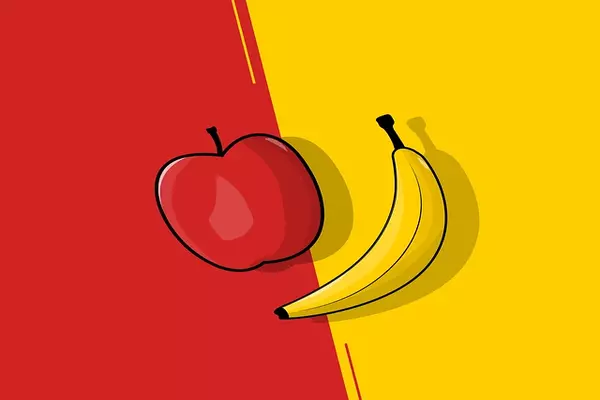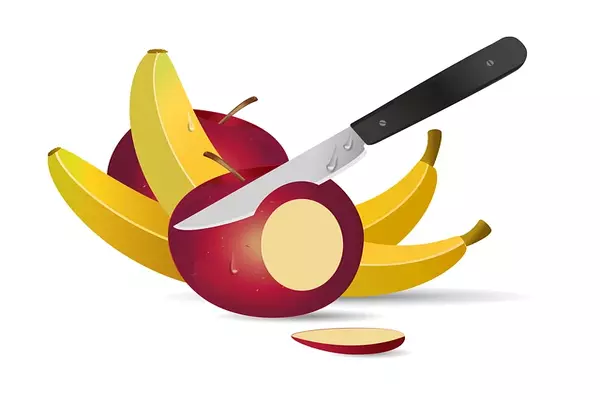Fruits are a popular healthy snack choice when it comes to weight loss. Due to their nutrient content and low-calorie count, apples and bananas, two of the most popular fruits consumed worldwide, are frequently recommended as great options for weight loss. However, the question of whether an apple or a banana is better for weight loss is debated.
Both apples and bananas are excellent options for a healthy diet because they contain fiber, vitamins, and minerals. The high fiber content of apples is well known for helping you feel fuller for longer and preventing overeating. On the other hand, bananas are a great source of potassium, which is vital for preserving a normal blood pressure level.
While both fruits have advantages, some claim that one Fruit may be superior to the other for weight loss. Bananas, for example, have a higher sugar content than apples, which may cause blood sugar spikes and make losing weight more difficult. On the other hand, apples are known for their ability to curb cravings and promote feelings of fullness, which can help you avoid snacking on unhealthy foods.
This article examines the question, “Is an Apple or Banana better for Weight Loss?” Additionally, we’ll review some tips for incorporating these fruits into your diet to maximize their ability to aid in weight loss.
Table of Contents
Apple Vs. Banana Nutrition Facts
Apples and bananas are both healthy fruits, but their nutrient profiles differ in some ways.

The nutritional information for a medium apple (182 grams) and a medium banana (118 grams) is shown below for comparison:
| Nutrient | Apple (182g) | Banana (118g) |
| Calories | 95 | 105 |
| Carbohydrates | 25g | 27g |
| Fiber | 4g | 3g |
| Protein | 1g | 1g |
| Fat | 0g | 0g |
| Vitamin C | 14% DV | 17% DV |
| Vitamin K | 5% DV | 1% DV |
| Potassium | 6% DV | 12% DV |
| Magnesium | 2% DV | 8% DV |
Apples and bananas have similar amounts of fiber, vitamins, and minerals but are lower in calories, fat, and sodium. Because both fruits are filling and have a high fiber content, which can help promote feelings of fullness and reduce hunger, they can help with weight loss.
Apples may be more satiating than bananas because they contain more fiber. Apple pectin has also been demonstrated to aid in weight loss by lowering dietary fat absorption and enhancing feelings of fullness. While bananas are a good source of potassium, which can help control blood pressure and lower the risk of heart disease, they are also a good source of fiber. In general, apples and bananas are healthy weight-loss foods that can be incorporated into a balanced diet in moderation.
Which Fruit has more sugar: Apples or Bananas?
Fruits like apples and bananas are naturally sweet because they contain sugar. There are some variations in their sugar levels, though.
● In comparison to a medium-sized banana, which has about 14 grams of sugar, a medium-sized apple has about 19 grams of sugar. Apples, therefore, have a higher sugar content than bananas.
● It’s important to remember that fruit sugar is naturally occurring and distinct from the added sugars present in processed foods. Additionally, fruits provide important nutrients for our health, such as fiber, vitamins, and minerals.
● Apples and bananas are healthy fruit options with many health advantages. Apples are high in antioxidants and are known for reducing the risk of chronic illnesses like diabetes, cancer, and heart disease. Conversely, Bananas are rich in potassium and can support healthy digestion and blood pressure regulation.

Even though Apples have more sugar than Bananas, both fruits are still healthy options and should be a part of a well-balanced diet. It is advised to eat a variety of fruits to get a variety of nutrients and health advantages.
Is an Apple or a Banana better for Weight Loss?
Which fruit is “better” for weight loss may depend on dietary requirements and personal preference. Both apples and bananas can be excellent choices. The following are some ways that both fruits can assist with weight loss:
● Calorie-efficient: Apples and bananas have a low-calorie count, with a medium apple having about 95 calories and a medium banana having about 105 calories. Including one of these fruits in your meal or as a snack can help you feel full without upping your calorie intake.
● High in fiber: Both fruits are excellent sources of fiber, which can make you feel satisfied and full after eating. Additionally, fiber promotes satiety by slowing digestion and balancing blood sugar levels, which may help reduce overeating and cravings.
● Contains many nutrients: Apples and bananas contain vitamins and minerals crucial for good health. Compared to bananas, which are high in potassium, apples are a good source of vitamin C. Consuming foods high in Nutrients can help ensure that your body gets the nutrients it needs without consuming excessive calories.
● Adaptable: Both fruits are easy to incorporate into your diet because they can be enjoyed in various ways and are versatile. While bananas can be eaten alone, sliced into oatmeal or yogurt, or blended into smoothies, apples can be eaten raw, cooked, or baked.
The low calories, high fiber, nutrient density, and versatility of apples and bananas make them excellent options for weight loss. You can feel full and satisfied by choosing Fruit as a snack or a meal without adding too many calories to your diet.
Benefits of Apple Vs. Banana
The advantages of apples and bananas are contrasted in the following table:
| Benefits | Apple  | Banana  |
| Nutritional value | high in antioxidants, vitamin C, and fiber | A rich source of fiber, vitamin B6, vitamin C, and potassium |
| Digestive health | due to its high fiber content, which aids in digestion and prevents constipation. | Due to its high fiber and resistant starch content, it regulates bowel movements and prevents constipation. |
| Heart health | reduces the risk of heart disease because it contains a lot of antioxidants and soluble fiber. | Due to its high potassium content, spinach lowers blood pressure and lowers the risk of developing heart disease. |
| Weight management | low in calories and high in fiber, preventing you from overeating by keeping you satisfied for longer. | It is a healthy snack for weight management because it is low in fat and calories. |
| Brain health | Due to its high antioxidant content, it may lower the risk of developing neurodegenerative diseases | Due to the high tryptophan content, which the brain converts into serotonin, it may enhance mental function and mood. |
| Energy | High in complex carbohydrates and natural sugars, giving off steady energy without crashing | Simple carbohydrates and natural sugars in abundance, giving you a quick energy boost. |
| Skin health | Apples are a great source of antioxidants, which can help with skin health. | Bananas also contain Vitamin C and other nutrients that can support healthy skin. |
The bottom line is that apples and bananas have a lot of health advantages. Bananas are a great source of vitamin B6, vitamin C, potassium, and fiber, while apples are a fantastic source of fiber, vitamin C, and antioxidants.
Both fruits are calorie-efficient and healthy for those trying to lose weight. Additionally, both fruits can aid in digestion and promote heart health.
Bananas and apples have natural sugars that give off energy and can improve skin health. The decision between the two fruits may ultimately come down to taste and accessibility.
Conclusion
In conclusion, apples and bananas can be fantastic additions to a weight loss diet due to their low-calorie and high-fiber contents. Bananas have more potassium and other crucial nutrients, while apples have fewer calories and more fiber. The best option between the two fruits is taste preferences and dietary requirements.

It’s important to remember that weight loss cannot be achieved by simply increasing one’s intake of apples or bananas. Adopting a healthy, balanced diet consisting of various nutrient-dense foods, regular exercise, and a healthy lifestyle is necessary for achieving long-term weight loss.
Also, when eating apples or bananas, keep your portion sizes in check because both fruits have a high natural sugar content that can affect your blood sugar levels. Choosing fresh fruits over canned or dried alternatives is also recommended to avoid added sugars and preservatives.
Making a decision on “Is an Apple or Banana better for Weight Loss?” Both apples and bananas are good for health, low-calorie fruits that are helpful for weight loss. But combining them with a balanced, nutritious diet and regular exercise is the key to achieving and maintaining a healthy weight.
Frequently Asked Questions
Q1: What fruit has more sugar than a banana?
Ans: There are several fruits with more sugar than a banana, which has about 14 grams of sugar per 100 grams. Here are some examples:
● Grapes: Every 100 grams of grapes contains about 16 grams of sugar.
● Mangoes: Mangoes have approximately 23 grams of sugar per 100 grams.
● Pineapples: Pineapples contain approximately 16 grams of sugar per 100 grams.
● Pomegranates: pomegranates have approximately 13 grams of sugar per 100 grams
● Cherries: The sugar content of cherries is approximately 12 grams per 100 grams.
It’s important to remember that while fruits contain natural sugars, they also contain significant amounts of fiber, vitamins, and other nutrients crucial for a balanced diet. Fruits should therefore be included in moderation as part of a healthy diet.
Q2: Is it good to eat a banana daily?
Ans: Since bananas are a great source of fiber, vitamins, and minerals, it is generally advisable to eat one every day. Potassium, which is essential for preserving healthy blood pressure and heart function, is another nutrient that can be found in bananas. Bananas are a healthy snack option because they can also support feelings of fullness and regulate digestion. Before including bananas in your daily diet, consult your doctor if you have a medical condition requiring you to restrict your potassium intake.
Q3: What is the ideal time to eat a banana?
Ans: There is no “best” time of day to eat a banana because it can be a healthy snack or an addition to a meal at any time. Generally, depending on their individual needs and preferences, some people may find that eating a banana at certain times of the day is more beneficial for them. Here are a few examples:
● Bananas are a healthy pre-workout snack option because they are a good source of potassium and carbohydrates. A banana eaten 30 minutes to an hour before working out can help with energy and stave off cramps.
● Bananas can be a great mid-morning or mid-afternoon snack because they are filling and give you a boost of energy. Consuming a banana when you’re hungry can help you avoid overeating at meals and maintain stable blood sugar levels.
● Bananas, which are naturally sweet and can sate a sweet tooth, can be a healthier alternative to sugary desserts. After a meal, eating a banana as a dessert can help reduce the desire for less healthy sweets.
The ideal time to eat a banana depends on your requirements and preferences. Pay attention to your body’s cues and eat when you’re ravenous or need an energy boost.
Q4: How many bananas per day are safe?
Ans: Depending on a person’s age, sex, and level of physical activity, different amounts of bananas are suggested daily. However, one to two bananas daily are generally considered safe. Following are some examples of the daily banana intake recommendations based on age:
● Children (ages 1-3): 1/2 to 1 banana per day
● Children (ages 4-8): 1 banana per day
● Children (ages 9-13): 1 to 1.5 bananas per day
● Teenagers (ages 14-18): 1.5 to 2 bananas per day
● Adults (ages 19-50): 1.5 to 2 bananas per day
● Adults (ages 51 and older): 1 to 1.5 bananas per day
It’s crucial to remember that some people may be sensitive to or allergic to bananas, which can result in negative reactions. The best action is to speak with your healthcare provider for individualized advice if you have any worries or medical conditions that may be impacted by eating bananas.
Q5: What are the benefits of eating a banana on an empty stomach?
Ans: Eating a banana on an empty stomach has many potential advantages, including:
● Better digestion: Dietary fiber, which is abundant in bananas and helps to regulate bowel movements and prevent constipation, improves digestion.
● Energy boost: Consuming bananas on an empty stomach can give you a quick energy boost because they are a good source of natural sugars and carbohydrates.
● Increased satiety: Resistant starch, a type of carbohydrate that can aid in promoting feelings of fullness and decreasing appetite, is also abundant in bananas.
● Better nutrient absorption: Eating a banana on an empty stomach can aid in improving the absorption of important nutrients like calcium and iron by lowering the number of other foods that compete with the banana for absorption in the digestive tract.
● A stronger immune system: Bananas are a good source of vitamin C and other antioxidants, supporting a strong defense mechanism and lowering the risk of infections.
Eating a banana on an empty stomach can be a healthy decision that offers a wealth of advantages for immediate energy and long-term health.
Q6: Can I eat apples every day?
Ans: Yes, including apples in your diet regularly can help you lose weight. Because apples are low in calories and high in fiber, they can keep you feeling full for longer and may even encourage you to consume fewer calories overall. The high fiber content of apples also slows digestion, which can help regulate blood sugar levels and prevent the highs and lows that can lead to overeating.
Q7: Can I eat apples at night?
Ans: Yes, you can eat apples at night. Apples are a fruit that is good for you and can be eaten at any time of the day. The best time to eat your apple is at least an hour or two before bed because eating a heavy meal or snack right before bed can disrupt your sleep. Before making any dietary changes, it’s also a good idea to speak with a healthcare provider if you have any particular dietary restrictions or medical conditions.
Q8: How many apples to eat a day?
Ans: According to an old proverb, “An apple a day keeps the doctor away.” Although there is no set recommendation for how many apples you should eat daily, adding one to two medium-sized apples to your daily diet can be beneficial. Apples are a good source of antioxidants, fiber, and vitamin C, and they may also help reduce your risk of developing chronic illnesses like heart disease and some types of cancer. However, keep in mind that a balanced diet includes a variety of fruits and vegetables, so don’t rely solely on apples to meet your nutritional needs.
Q9: Are apples high in sugar?
Ans: Apples contain sugar, but they are not considered high-sugar fruit. A medium-sized apple contains approximately 19 grams of sugar, most fructose. On the other hand, apples contain fiber, which can slow sugar absorption into the bloodstream and help regulate blood sugar levels. Furthermore, the sugar content of apples varies by variety, with some being sweeter than others. For example, red and yellow apples are sweeter than green apples.
Apples can be a healthy addition as long as they are eaten in moderation and as part of a balanced diet. Always seek advice from a registered dietitian or other healthcare professionals if you have questions about your sugar intake.
Q10: Is it good to consume apples on an empty stomach?
Ans: Yes, eating apples on an empty stomach is a good idea. Eating apples on an empty stomach can help to control blood sugar levels, speed up digestion, and increase feelings of satiety because apples are a great source of fiber and nutrients. It’s best to consume apples in moderation because some people may feel uncomfortable or bloated if they eat too many, especially if they do so on an empty stomach.
Sources
- https://stellinamarfa.com/fruits/when-should-you-eat-a-banana-at-night/
- https://blog.myfitnesspal.com/this-or-that-is-an-apple-or-banana-healthier/
- https://www.healthline.com/nutrition/best-weight-loss-fruits
- https://www.macappsworld.com/benefits-of-eating-banana-on-empty-stomach/
- https://www.sciencedirect.com/science/article/abs/pii/S0141813019368114
- https://www.glamour.com/story/guess-the-fruit-that-will-help#:~:text=Yes,%20apples%20pack%20more%20fiber,you%20had%20your%20apple%20today?
- https://www.livestrong.com/article/445004-banana-vs-apple/
- https://www.natureword.com/which-is-healthier-bananas-or-apples/
